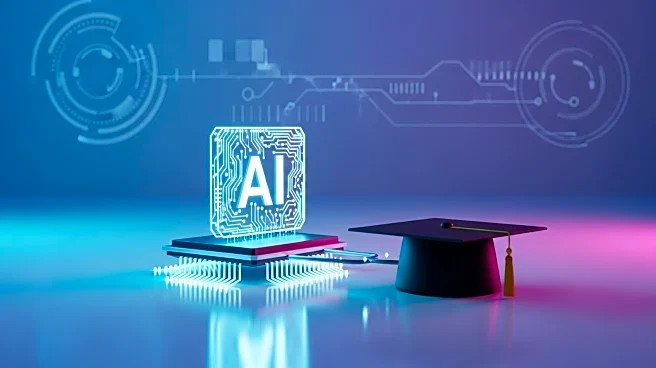What's Happening?
Federal Reserve Chair Jerome Powell has indicated that artificial intelligence (AI) may be contributing to rising unemployment rates, particularly among young graduates. During a press conference, Powell acknowledged the uncertainty surrounding the direct impact of AI on employment but suggested it is 'probably a factor.' The U.S. labor market has shown signs of weakening, with only 22,000 jobs added in August, a significant drop from the previous month. This trend has raised concerns about the role of AI in potentially displacing entry-level positions traditionally filled by recent graduates. A report from the New York Fed highlighted a noticeable deterioration in the job market for individuals aged 22 to 27 in early 2025. Additionally, a Stanford study found that early-career workers in AI-exposed jobs experienced a more significant decline in employment. Executives from companies like Ford and Shopify have expressed intentions to leverage AI for automating tasks, potentially reducing the need for human workers.
Why It's Important?
The potential impact of AI on employment is a critical issue for the U.S. economy, particularly for young graduates entering the workforce. If AI continues to replace entry-level jobs, it could lead to a 'lost generation' of workers struggling to find employment. This shift could have long-term implications for economic growth and social stability, as a significant portion of the workforce may face prolonged unemployment or underemployment. The acknowledgment by the Federal Reserve highlights the need for policymakers to address the challenges posed by AI in the labor market. Adjustments in education, hiring norms, and policy may be necessary to mitigate the adverse effects of AI on employment. The call for data collection on AI's impact by economists underscores the urgency of understanding and addressing these challenges.
What's Next?
The Federal Reserve and other stakeholders may need to prioritize research and data collection to better understand AI's impact on the labor market. Policymakers could consider developing strategies to support workers displaced by AI, such as retraining programs and educational initiatives. Companies may also need to balance the benefits of AI automation with the social responsibility of maintaining a stable workforce. The ongoing dialogue between economists, policymakers, and industry leaders will be crucial in shaping the future of work in an AI-driven economy.
Beyond the Headlines
The ethical implications of AI-driven unemployment raise questions about the responsibility of corporations and governments in ensuring equitable access to job opportunities. The potential for AI to exacerbate existing inequalities in the labor market could lead to broader societal challenges, including increased economic disparity and social unrest. Addressing these issues may require a reevaluation of the social contract between employers, employees, and the state.












